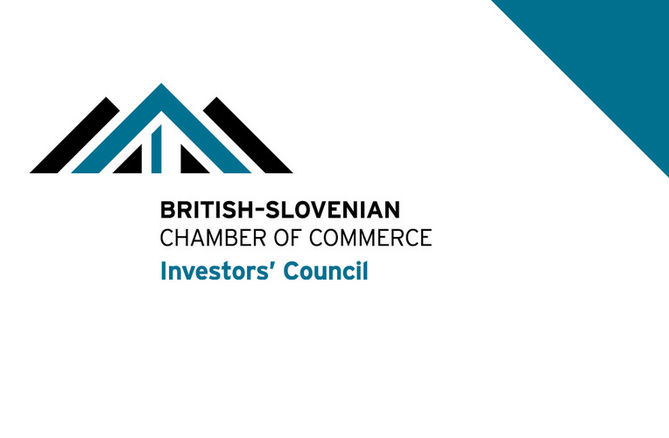Conference: How Can the Slovenian Economy Benefit From New Green Financial and Insurance Mechanisms?

Ljubljana, 22 March 2024 - Working with businesses to promote sustainability across the economy, and thereby channeling capital towards sustainable investments, defines the key role of the financial sector in driving the green transition.
The conference of the British-Slovenian Chambers of Commerce on new financial and insurance mechanisms aligned with the ESG requirements brought together a wide range of experts and financial experts, as well as prominent business representatives from Slovenia and Croatia, who shared their views and opinions with their UK counterparts.
The British Ambassador to Slovenia, Tiffany Sadler, expressed the support of the UK, a leader in green finance, to Slovenia and Croatia in the development of new financial tools, pointing out, "Today’s conference is focussed on both the challenges and opportunities of green finance. This is against the backdrop of the worst floods in Slovenia’s history last year – floods linked by meteorologists to climate change. Climate change is affecting our economies and our financial sectors and we need to move quickly to minimise the costs and mitigate the risks."
"Climate change and related developments also affect the fulfilment of our key tasks of ensuring price and financial stability," stated Boštjan Vasle, Governor of the Bank of Slovenia, in his opening remarks at the conference, adding, "Related to our financial stability mandate, banks are significantly exposed to high-carbon and other vulnerable companies through loans and bond purchases which makes them exposed to transition risk. As supervisors, it falls upon us to encourage and direct banks to identify and measure climate-related risks and, above all, to manage them efficiently."
The fact that climate change has a major impact on price and financial stability was echoed by Sandra Švaljek, Deputy Governor of the Croatian National Bank, who added: "The share of green products in financial portfolios on the Croatian market is very limited. We should not only be concerned with the creation of new green products, but also with the demand for them. We need to focus on customer awareness and on making sure that they know how they can actually benefit from such financial products."
That the financial sector has an important role to play in driving the green transition was also shared by Luka Vesnaver, Chairman of the British-Slovenian Chamber of Commerce and Partner at Ion Advisory: "It is the financial sector that channels capital towards sustainable investments, manages environmental risks, advocates for a supportive environment, and works with businesses to promote sustainability across the economy."
Blaž Brodnjak, President of the Management Board of NLB, was critical that E in ESG standards cannot work without S and G: "You can't preach to people to be green when there are wars going on and people are shooting one another. My dream is to spend half of what we invest in defence on the green transition." He believes that "there is a lot of money in the banking system in our region, but there is a lack of projects to deliver the green transition".
On the potential of green financial products, Luke Davies, Director, Sustainable Banking Group at Barclays Investment Bank, noted, "Green bonds, sustainability-linked loans, and impact investing funds represent just the tip of the iceberg in terms of the instruments at our disposal to channel significant capital towards sustainable initiatives. These products not only offer competitive returns and risk profiles but also ensure that investors are part of the solution to global environmental issues."
The interest in investing in the sustainable economy is rising, according to Maja Žgajnar, Partner at CMS Reich-Rohrwig Hainz: "Companies that are involved or getting involved in the sustainability economy have an edge when looking for investors or financing. Resource-efficient companies have higher returns and are better placed than competitors to generate long-term results. These companies can use their advantage to attract more interest in their shares and debt instruments."
"Sustainability is inseparable from asset management," agreed Benjamin Jošar, President of the Management Board of Triglav Skladi, who added that the strategic orientation is reflected in the company's overall business and, consequently, also in its product range. "We have integrated sustainability factors into the investment process, and most of our funds are already managed in a way that takes these aspects into account."
With a diverse range of green products, Zavarovalnica Triglav is also following the environmental requirements, pointed out Peter Filip Jakopič, Director of UW and PD for Property and Casualty, "We offer financial security to drivers of micromobiles and electric vehicles and reward those limiting environmental pollution with their driving style. For car claims, we aim for repairs rather than replacements with new parts. We provide owners of residential houses with solar panels can insure the consequences of possible damage and destruction of the power plant. And for some risk we use our own segmentation tool, which allows us to offer lower premiums for less exposed risks."
Photos from the event are available here.
Special acknowledgement goes to the Main Partner - NLB d.d.; Event Partners - Slovenian Insurance Supervision Agency, British Embassy Ljubljana, Chapter Zero Slovenia, Triglav Skladi, and Bank Association of Slovenia; and Panel Partners: CMS Reich-Rohrwig Hainz and Zavarovalnica
The conference was divided into 3 panels. The first panel on innovative green financial products featured Blaž Brodnjak, President of the Management Board of NLB, Benjamin Jošar, President of the Management Board of Triglav Skladi, Luke Davies, Director, Sustainable Banking Group at Barclays Investment Bank, Felicity Hall, Head of Sustainable Finance Innovation, City of London Corporation, Nikolina Kolarić, Chief Sustainability Officer at Hrvatska poštanska banka, Maja Žgajnar, Partner at CMS Reich-Rohrwig Hainz, and Robert Bauchmüller, Chief Officer | Strategy at Centre of Excellence in Finance.
The second panel on the impact of the green transition on monetary and investment policy featured Tina Žumer, Vice Governor of the Bank of Slovenia, Sandra Švaljek, Deputy Governor of the Croatian National Bank, Marjan Divjak, Director-General of the Treasury Directorate at the Ministry of Finance and Member of the Supervisory Board of the SID Bank, Tamara Perko, Director of the Croatian Banking Association, Stanislava Zadravec Caprirolo, Director of the Bank Association of Slovenia, Nina Seega, Director of the Centre for Sustainable Finance at the Cambridge Institute for Sustainability Leadership, and Simon Savšek, Head of Ljubljana Office, European Investment Bank.
The third panel on green insurance products featured Maja Krumberger, Managing Director of the Slovenian Insurance Association, Ante Žigman, President of the Board of the Croatian Financial Services Supervisory Agency, Marijana Jakovac, CEO of Allianz Hrvatska, Peter Filip Jakopič, Director of UW and PD for Property and Casualty at Zavarovalnica Triglav, Rebecca Deegan, Chief Sustainability Officer at the Association of British Insurers, and Gorazd Čibej, Managing Director of the Insurance Supervision Agency.


